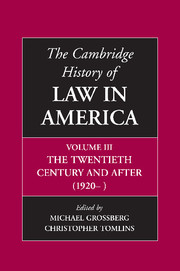Book contents
- Frontmatter
- 1 Law and the State, 1920–2000: Institutional Growth and Structural Change
- 2 Legal Theory And Legal Education, 1920–2000
- 3 The American Legal Profession, 1870–2000
- 4 The Courts, Federalism, and The Federal Constitution, 1920–2000
- 5 The Litigation Revolution
- 6 Criminal Justice in the United States
- 7 Law and Medicine
- 8 The Great Depression and the New Deal
- 9 Labor’s Welfare State: Defining Workers, Constructing Citizens
- 10 Poverty law and income Support: From the Progressive Era to the War on Welfare
- 11 The Rights Revolution in the Twentieth Century
- 12 Race and Rights
- 13 Heterosexuality as a Legal Regime
- 14 Law and the Environment
- 15 Agriculture and the State, 1789–2000
- 16 Law and Economic Change During the Short Twentieth Century
- 17 The Corporate Economy: Ideologies of Regulation and Antitrust, 1920–2000
- 18 Law and Commercial Popular Culture in the Twentieth-Century United States
- 19 Making Law, Making War, Making America
- 20 Law, Lawyers, and Empire
- Bibliographic Essays
- Notes on Contributors
- Index
- References
15 - Agriculture and the State, 1789–2000
Published online by Cambridge University Press: 28 November 2008
- Frontmatter
- 1 Law and the State, 1920–2000: Institutional Growth and Structural Change
- 2 Legal Theory And Legal Education, 1920–2000
- 3 The American Legal Profession, 1870–2000
- 4 The Courts, Federalism, and The Federal Constitution, 1920–2000
- 5 The Litigation Revolution
- 6 Criminal Justice in the United States
- 7 Law and Medicine
- 8 The Great Depression and the New Deal
- 9 Labor’s Welfare State: Defining Workers, Constructing Citizens
- 10 Poverty law and income Support: From the Progressive Era to the War on Welfare
- 11 The Rights Revolution in the Twentieth Century
- 12 Race and Rights
- 13 Heterosexuality as a Legal Regime
- 14 Law and the Environment
- 15 Agriculture and the State, 1789–2000
- 16 Law and Economic Change During the Short Twentieth Century
- 17 The Corporate Economy: Ideologies of Regulation and Antitrust, 1920–2000
- 18 Law and Commercial Popular Culture in the Twentieth-Century United States
- 19 Making Law, Making War, Making America
- 20 Law, Lawyers, and Empire
- Bibliographic Essays
- Notes on Contributors
- Index
- References
Summary
Legal history is full of stories about agriculture, but few of them are told as such. This becomes all the more surprising when one pauses to consider that many of the legal historians who revolutionized the field after 1950 did so by studying phenomena that were in fact central to the history of agriculture in the United States. In the work of James Willard Hurst, for example, land policy, commodities trading, and the rise of modern markets and transportation networks were hallmarks of the new socioeconomic mode of legal history. Yet, even as Hurst and others pioneered the move away from doctrinal and constitutional analysis toward the real-world problems of economy and society, they generally failed to notice that the economy from which the problems that fascinated them arose was in large part distinctively agricultural. The successor generation of historians who expanded Hurst’s economic focus to include race, ethnicity, and gender likewise paid scant attention to the overwhelmingly rural character of American society during most of the nation’s history, except to note a perhaps oversimplified progression away from agricultural and rural to industrial and urban. To generalize, the new legal historians’ commitment to law “in context” was, it turns out, quite selective in the contexts it chose to consider of importance. “Economy and society” were important, but apparently did not vary much according to where they were situated.
- Type
- Chapter
- Information
- The Cambridge History of Law in America , pp. 522 - 562Publisher: Cambridge University PressPrint publication year: 2008
References
- 1
- Cited by

